Key takeaways:
- Corporate accountability is crucial for building trust and loyalty among stakeholders, emphasizing ethical practices and transparency.
- Key principles include transparency, ethical decision-making, sustainability, stakeholder engagement, and accountability, which enhance overall corporate responsibility.
- Engaging stakeholders fosters genuine dialogue, strengthening relationships and enhancing corporate strategies.
- Future trends in corporate accountability involve leveraging technology, increasing stakeholder engagement, and prioritizing sustainability as core practices.
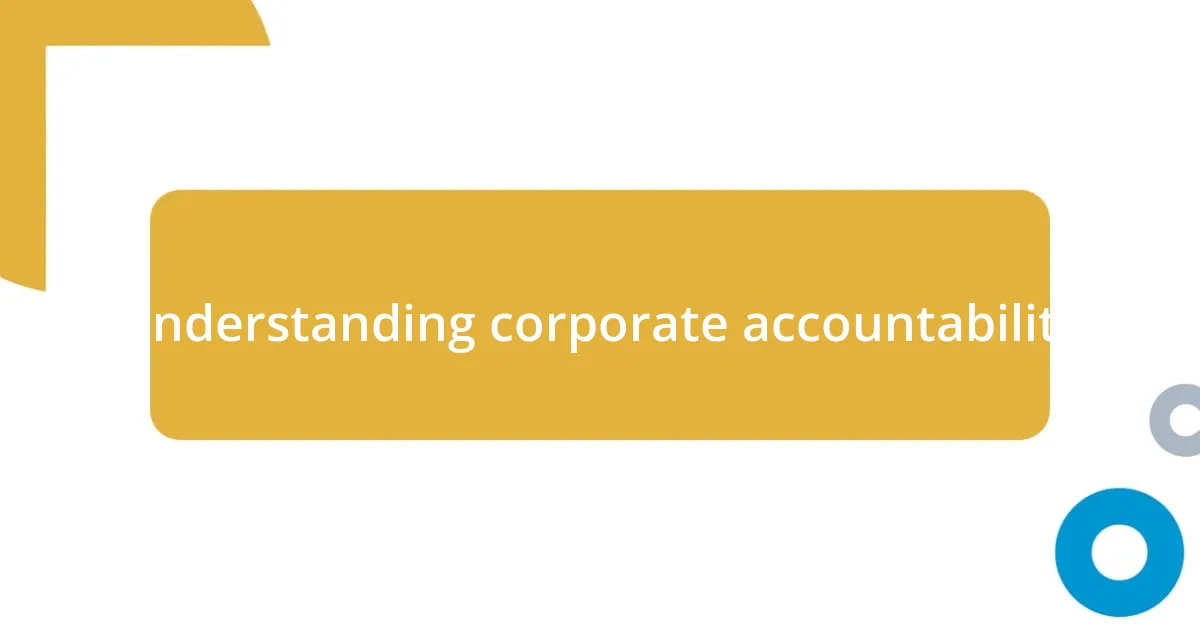
Understanding corporate accountability
Corporate accountability is fundamentally about a company’s responsibility to its stakeholders, which includes employees, customers, suppliers, and the community. I’ve often found myself pondering the impact of corporate actions, especially when I see a business taking steps to genuinely connect with its audience. Do we feel more respected as consumers when a corporation aligns its decisions with ethical practices? Personally, I believe we do.
When we think about corporate accountability, it’s not just about adhering to regulations; it’s about building trust. I remember a time when a local business I supported publicly addressed a flaw in its product, acknowledging their mistake and offering refunds. That transparency inspired me to remain loyal to them. It’s these moments that remind us that companies are not just faceless entities; they are composed of people who can choose to act ethically.
Moreover, the emotional weight behind corporate accountability can’t be ignored. Think about how you would feel if a large corporation made a significant error, affecting lives and livelihoods. It’s easy to feel disillusioned, right? I’ve experienced that sense of betrayal when I’ve seen companies prioritize profits over people. This ultimately reinforces why accountability isn’t merely a legal obligation; it’s a moral one that shapes public perception and loyalty.
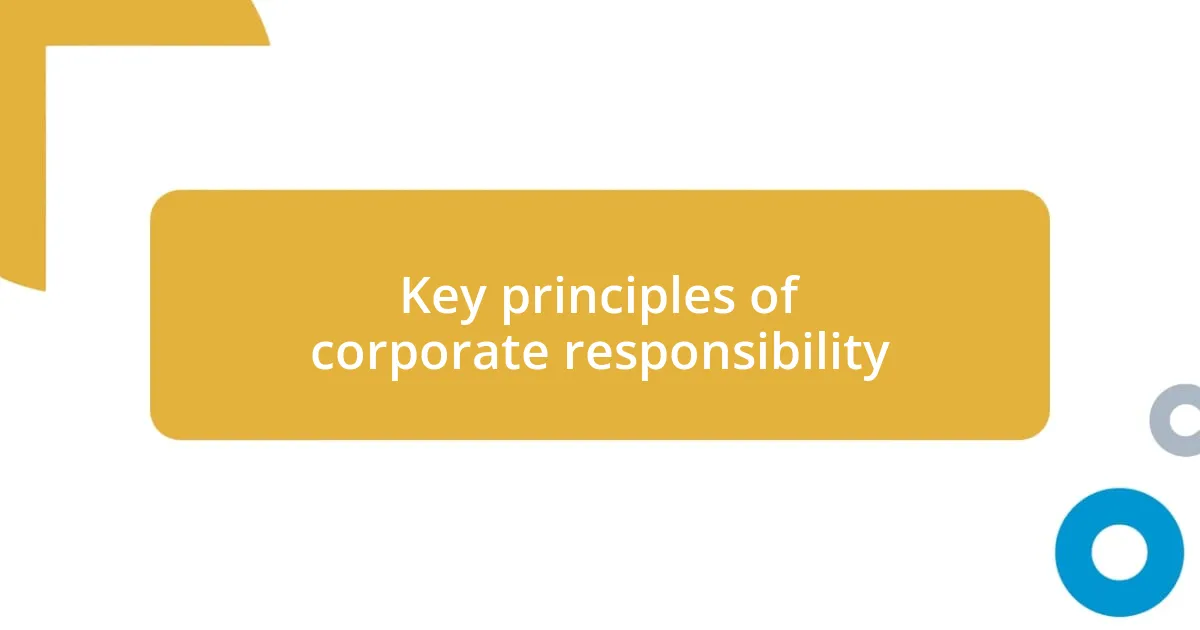
Key principles of corporate responsibility
One of the key principles of corporate responsibility is transparency. From my experience, when companies are open about their practices, it fosters a sense of trust. I remember the first time I learned about a company’s efforts to reduce its environmental footprint; they readily shared their progress and challenges. It felt refreshing and genuine, reinforcing my belief that they valued their impact on the community.
Another vital principle involves ethical decision-making, which extends beyond mere compliance. Businesses must evaluate how their choices affect all stakeholders, not just their bottom line. I’ve seen organizations thrive by prioritizing fair wages and safe working conditions. Here’s a snapshot of key principles of corporate responsibility:
- Transparency: Openly share information about operations and goals.
- Ethical Decision-Making: Consider the impacts of choices on the community and environment.
- Sustainability: Commit to practices that support long-term ecological balance.
- Stakeholder Engagement: Actively involve stakeholders in decision-making processes.
- Accountability: Acknowledge and rectify mistakes while ensuring responsible actions.
These principles highlight a company’s commitment not only to profit but also to the well-being of society, an approach that resonates deeply with me. When firms embody these values, it’s like a friend being honest with me—a connection deepens and trust builds.
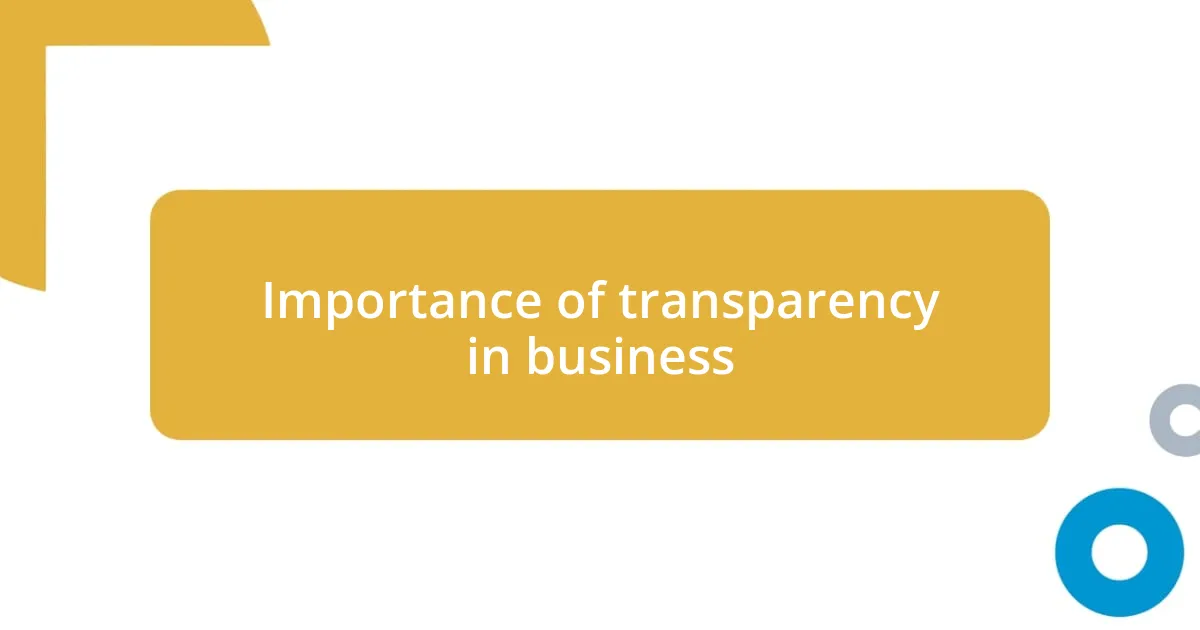
Importance of transparency in business
Transparency in business is essential for building trust and fostering strong relationships with stakeholders. I’ve always believed that when a company is forthcoming about its processes, challenges, and even mistakes, it transforms their image from a distant entity into a relatable one. For instance, I recall a tech firm that openly reported its cybersecurity breach, explaining not just the incident but also how they were taking steps to improve. Their candor not only reassured me but also sparked my respect for their commitment to doing better.
When companies prioritize transparency, they don’t just mitigate risks; they enhance their reputation. I think about a clothing brand I followed that chose to reveal their supply chain details. By making their sourcing practices transparent, they encouraged consumers like me to make informed choices about our purchases. It’s a powerful reminder of how openness can convert bewilderment into assurance and loyalty.
Furthermore, transparency drives accountability. It creates an environment where businesses are held responsible for their claims and actions. I remember witnessing a restaurant chain that touted its farm-to-table practices. When I discovered there were discrepancies, the backlash was swift, prompting the company to adjust and return to its commitment. It’s interesting to see how transparency not only protects but could also reinvigorate a company’s mission by aligning with its core values—making it a win-win for both the business and its audience.
| Aspects of Transparency | Impacts |
|---|---|
| Open Communication | Builds trust with stakeholders |
| Honesty in Reporting | Enhances company credibility |
| Accountability for Actions | Encourages responsible behavior |
| Details in Supply Chains | Informs consumer choices |
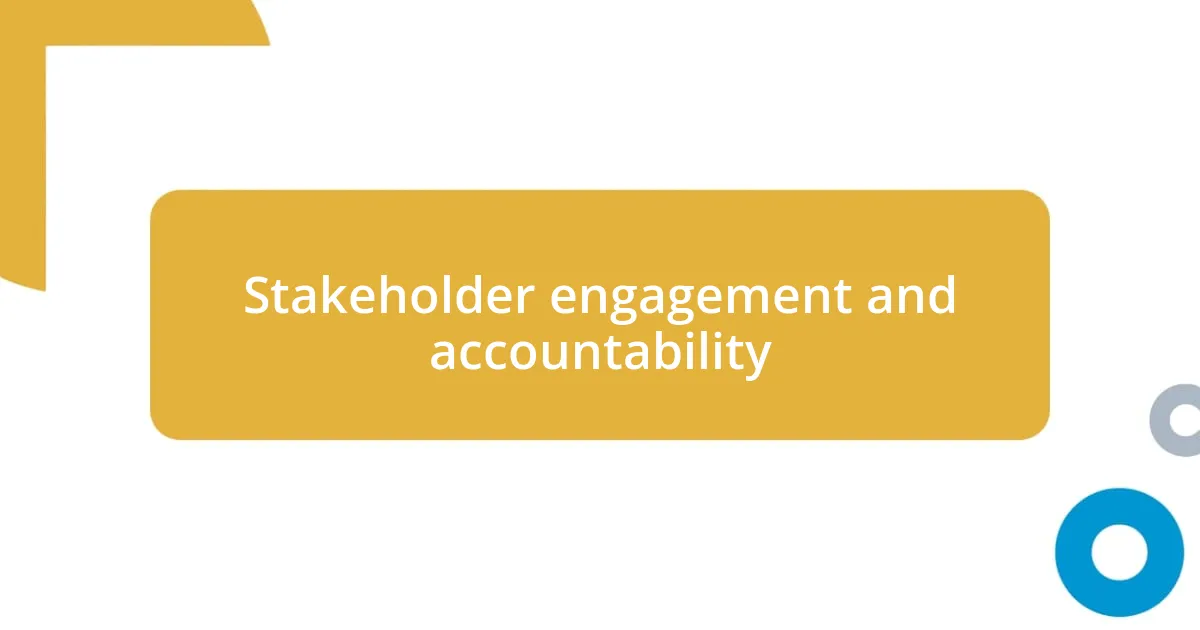
Stakeholder engagement and accountability
Engaging stakeholders is a crucial part of building accountability within a company. I once attended a community meeting hosted by a local energy firm where they sought feedback on their new sustainability initiative. It was a genuine effort to involve us, and I realized the power this engagement had in shaping their strategies. When companies actively listen to their stakeholders, it’s not only about gathering opinions; it’s about creating a partnership that values everyone’s input.
Thinking back on my experience, I’ve recognized how much companies can grow by fostering genuine dialogue. I remember being part of a focus group for a consumer goods company that was testing new eco-friendly products. They encouraged us to share our thoughts and feelings openly, and I felt appreciated as a stakeholder. This approach made the brand feel more relatable, enhancing my loyalty and resulting in an emotional connection that went beyond a simple buyer-seller relationship. Isn’t it fascinating how our voices can truly shape corporate strategies?
Moreover, accountability isn’t just a buzzword; it’s a culture rooted in stakeholder engagement. When a non-profit I supported mistakenly misallocated funds, they immediately reached out to donors like me, explaining the situation and how they planned to rectify it. Their proactive approach turned a potentially damaging scenario into an opportunity to strengthen trust. I think it’s moments like this that remind us that accountability is not just about admitting errors; it’s about taking bold actions to rectify mistakes, showcasing that a company values its commitments to all stakeholders involved.
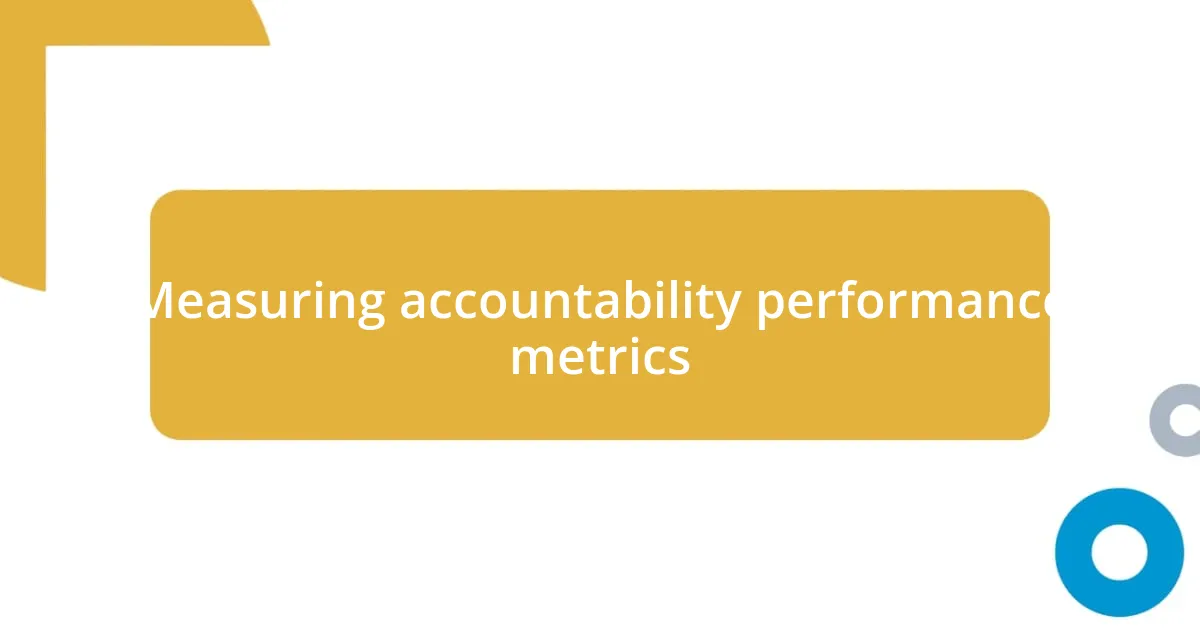
Measuring accountability performance metrics
Measuring accountability performance metrics is a fascinating endeavor. For me, one key metric is employee feedback. I once participated in an anonymous survey at my workplace, where team members could voice their thoughts on leadership decisions. The insights shared led to tangible changes in management practices, and it reminded me just how crucial it is to create channels for honest communication. I often wonder: if transparency starts from within, could it be the secret ingredient for corporate transformation?
Another aspect I’ve found invaluable is tracking social media sentiment. After a company I followed faced backlash for a poorly received ad, I watched how they turned to platforms like Twitter and Instagram to gauge public reaction. The openness demonstrated in their response was impressive, and I felt more engaged as a part of their community. Isn’t it powerful how real-time feedback can propel businesses to align their practices with stakeholder expectations?
Finally, I’ve experienced the impact of transparency reports. I recall reading a sustainability report from a brand I admire, detailing their steps toward reducing carbon emissions. The specific goals they set—and the progress shared—left me feeling optimistic about their commitment. It made me think: what if more companies followed this lead? By measuring accountability through such reports, businesses not only track their successes but also strengthen their connection to consumers like myself.
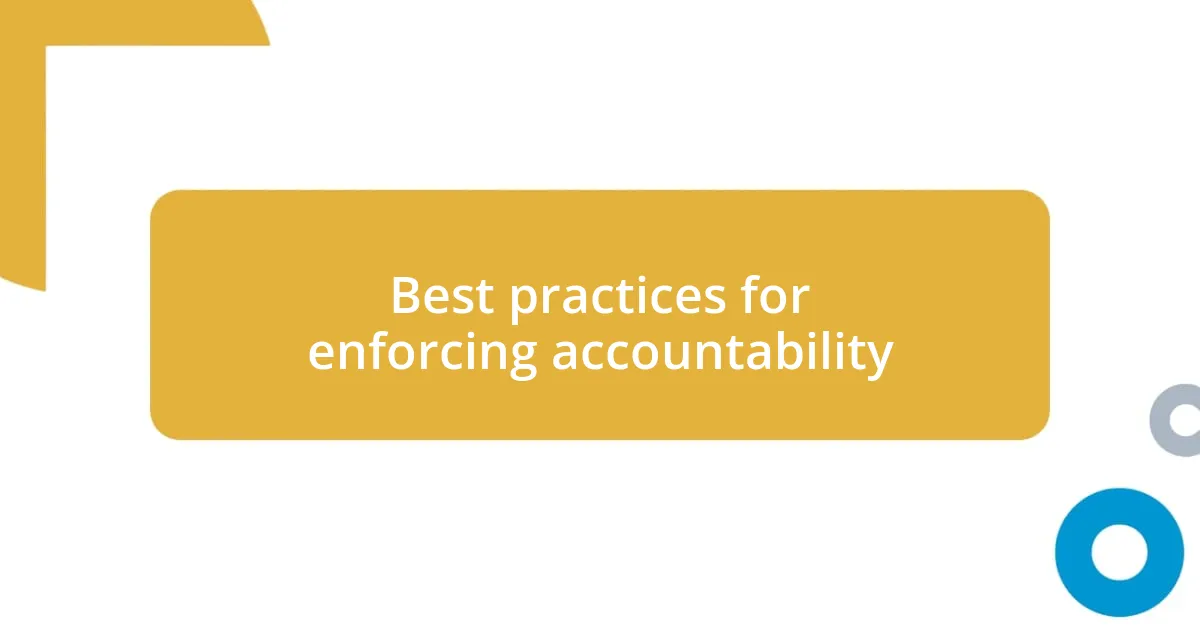
Best practices for enforcing accountability
One of the best practices I’ve observed for enforcing accountability is the implementation of regular training sessions. I remember attending a workshop at a previous job focused on ethical decision-making, where we discussed real-world dilemmas. It was enlightening to see firsthand how deepening our understanding of accountability principles empowers employees to make better choices. Isn’t it remarkable how knowledge can transform behavior in tangible ways?
Another effective method I’ve seen is the use of accountability dashboards. At a company I worked for, they developed a user-friendly interface that clearly displayed commitments and deadlines for various projects. This visual representation held everyone accountable, as we could all track progress together. I often wondered if other organizations could benefit from this simple yet powerful tool. Wouldn’t it be great to see accountability become part of the workspace culture?
I also believe that celebrating accountability successes plays a crucial role. At one of my previous workplaces, we had a monthly recognition ceremony where employees could highlight their peers for upholding accountability in their work. This not only reinforced good practices but also fostered a sense of community and encouragement. It made me reflect on the small wins that often go unnoticed—don’t we all thrive when our efforts are acknowledged?
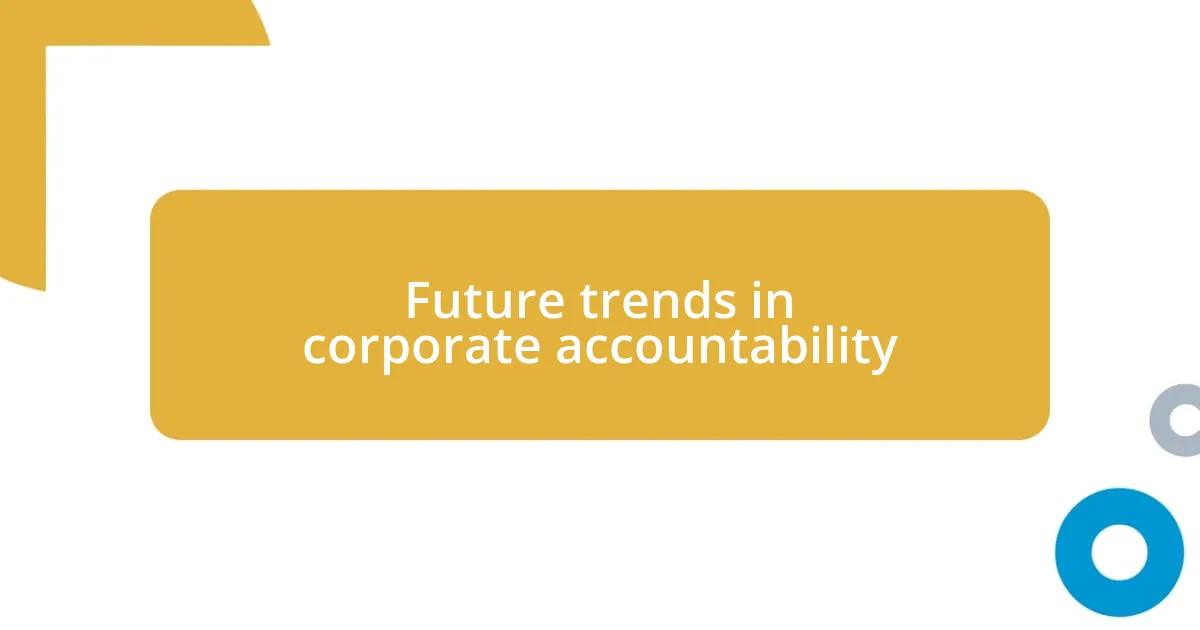
Future trends in corporate accountability
As we look ahead, I see technology playing a significant role in shaping corporate accountability. I remember attending a conference where presenters discussed the potential of AI in monitoring compliance and ethical standards. It struck me how using data analytics could streamline processes, identifying risks before they escalate. Could this be the future of proactive accountability? I believe it can be, turning potential issues into opportunities for growth.
Another emerging trend is the increasing demand for stakeholder engagement, especially from younger generations. I recently participated in a community forum focused on corporate responsibility, where passionate voices emphasized the importance of companies aligning their values with those of consumers. It made me realize that organizations can no longer afford to operate in silos; the more open and inclusive they are, the more they stand to gain. Isn’t it fascinating how consumers today are not just buyers but active participants in the corporate narrative?
Finally, I envision sustainability becoming a cornerstone of corporate accountability frameworks. Reflecting on my experience with a local startup that prioritized eco-friendly practices, I noticed how their commitment attracted loyal customers. The business thrived because it didn’t just talk the talk but actively engaged in responsible actions. How impactful would it be if more companies adopted sustainability as a key accountability measure? In my view, this integration is not only possible but essential for creating a better future.














